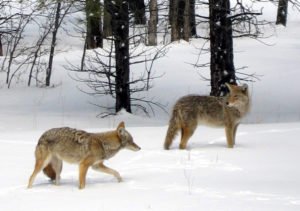Coyote Mates ~ they mate for life….until death do they part… And too often here in Maine, death comes long before they have the opportunity to grow old together. And why? …..Because our laws do not protect this important carnivore from violent human behavior. And as each legislative session meets in Augusta, a violent, small faction of individuals who think they can control our legislators,…present more bills to increase the cruel exploitation of our Coyotes here in Maine.
And so this year….it is LD 96 …..wanting to put into law a bounty now on Coyotes, and extend the barbaric practice of trapping by two more months ….it would then be from October 15 to February 15.
HAVE ANY OF YOU EVER OBSERVED THE EXCRUCIATING AGONY AND TERROR OF A COYOTE CAUGHT IN A TRAP…..AND IN THE WINTER, EXPOSURE TO THE EXTREME COLD?
I am attaching here a copy of the summary of this bill as well as a testimony of a Maine citizen before the Inland Fisheries and Wildlife committee this past week. I encourage all of you to contact your Senator and Representatives that go to Augusta, and tell them that you want to see bills up before the Legislature that give protection to our Coyotes not take away protection, and that you want them to vote this Bill down. Do you know how powerful your email is!
SUMMARY LD96
15 This bill does the following:
16 1. It authorizes the Commissioner of Inland Fisheries and Wildlife to adopt rules to
17 establish a coyote bounty system;
18 2. It provides that coyote bounties be paid from federal funding received from the
19 federal Pittman-Robertson Wildlife Restoration Act; and
20 3. It sets a coyote trapping season from October 15th to February 15th.
Ron Joseph, L.D. 96 Testimony before the Inland Fisheries and Wildlife Committee,
Feb. 19, 2013
Senator Dutremble, Representative Shaw, members of the Inland Fisheries and Wildlife
Committee, my name is Ron Joseph. For 33-years, I worked as a professional wildlife
biologist for the Maine Dept. of Inland Fisheries and Wildlife and the U.S. Fish and
Wildlife Service.
,
As the State s regional Wildlife biologist in Greenville in the late 1980s, I supervised the
coyote control program in the Moosehead Lake region. I understand the importance of
healthy deer populations to Maine s rural economy, from sporting lodge owners to mom
and pop convenience stores. I also understand why this committee is tempted to continue
efforts to kill coyotes to maintain deer numbers. I am not opposed to killing coyotes.
However, for several reasons, I am opposed to killing coyotes with public funds. First,
coyote control is ineffective. We have been killing coyotes in Maine since the 1970s, and
the deer herd has still not recovered in eastern, western, and northern Maine. The coyote
has been and remains the scapegoat for Maine s deer ills. Re-building the deer herd can
only be accomplished by protecting deer wintering areas. Second, trapping and snaring
coyotes maims and kills non-target animals. I have walked trap-lines with trappers who
have accidentally killed bobcats, deer, and bald eagles. Third, the history of coyote
control has proven to be a waste of state money. There were 13,000 coyotes in Maine in
1985. Today, despite State efforts and fimds expended, State biologists estimate the
coyote population has either remained unchanged or slightly increased.
According to former State Representative Linda McKee of Wayne, between 1985 and
2003, the State spent an average of $40,000/year killing coyotes. Collectively, that s
$680,000 spent killing coyotes during a 17-year period. Coyote control ~ as tempting as it
is — does not work. With coyote populations today at or above the 1985 levels, let the
numbers help you decide your decision.
Finally, LD 96, as written, proposes to use Federal Pittman-Robinson Act money to pay
for the state s coyote bounty program. Two weeks ago I sent an email to Amy Winston —
Committee Analyst —- to inform her that using P-R Act funds was illegal. Pittman-
Robinson provides Federal aid to States for management and restoration of wildlife,
hunter education, and acquisition and improvement of wildlife habitat. It does not pay
for predator control. If this Committee pursues a coyote control program, the money will
have to come trom Maine citizens. It makes no sense in these lean budget times to
continue spending State money on an ineffective coyote control.
For all the above reasons, I encourage you to vote against L.D. 96.







